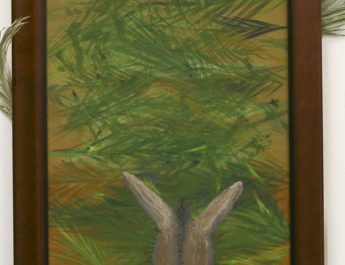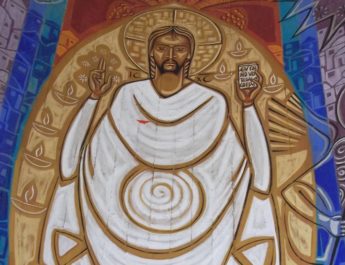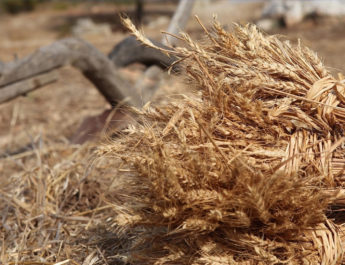Psalm 119:105-112
Proper 10A
105 Your wordA is a lampB to my feetC
and a lightD to my path.E
A “word” = dabar. From dabar (to speak, declare, discuss). This is speech, a word, a matter, an affair, charge, command, message, promise, purpose, report, request. It is a word, which implies things that are spoken of in a wide sense.
B “lamp” = ner. This is to glisten. It is used for a lamp, candle, or light in a literal or figurative sense.
C “feet” = regel. This is foot, endurance, or journey. It is a foot as the means of walking and so it implies a step or a greater journey. It can be used euphemistically for private parts.
D “light” = or. From or (to be or become light). This is light, sun, sunshine, dawn, or daylight. Figuratively, it can refer to light from instruction, light of a face (that is to say one that is cheerful or finds favor). It can refer to prosperity or salvation; a light that guides, a light eternal from Zion.
E “path” = nathiyb. Root may mean to tramp. This is a path beaten from regular use. So, it is pathway or traveler.
106 I have sworn an oathF and confirmedG it,
to observeH your righteousI ordinances.J
F “sworn an oath” = shaba. Perhaps from sheba (seven – the number of perfection/sacred fullness). This is to swear, curse, vow, make a covenant. Properly, it can mean to be complete. This is to seven oneself – as in affirming something so strongly it is as though it were said seven times.
G “confirmed” = qum. To arise, stand, accomplish, establish, abide. This is rising as in rising against, getting up after being sick or asleep, arising from one state to another, becoming powerful, or rising for action. It can also be standing in a figurative sense.
H “observe” = shamar. This is to keep, watch, or preserve. It means to guard something or to protect it as a thorny hedge protects something.
I “righteous” = tsedeq. This is rightness, righteousness, vindication. It is everything that is just or ethical. That which is right in a natural, moral, or legal sense. It also includes just weights (i.e. true weights). Figuratively, this is justice, righteousness, equity – even prosperity.
J “ordinances” = mishpat. From shaphat (to judge, defend, pronounce judgment, condemn, govern). This is a verdict or formal sentence whether from humans or from God. It includes the act of judging as well as the place that judging takes place, the suit itself, and the penalty. Abstractly, this is justice, which includes the rights of the participants.
107 I am severelyK afflicted;L
give me life,M O Lord,N according to your word.
K “severely” = ad + meod. Ad is even, until, while. Meod is perhaps from the same as uwd (firebrand, a poker). This is very, greatly, exceedingly. It can also mean vehemence, force, abundance.
L “afflicted” = anah. This is to be occupied with. It can also be bowed down. It can refer to a sense of humility or to a sense of being browbeaten, oppressed, afflicted, or depressed. This can be literal or figurative – depressed in mood or circumstance.
M “give…life” = chayah. This is to live or keep alive in a literal or figurative sense. So, it can be revive, nourish, or save.
N “Lord” = YHVH. From the same as YHVH (the name of the God of Israel, the self-existent and eternal one, the tetragrammaton; pronunciation has been lost to time so “Lord” is generally used in its place); {from havah (to be, become) or hayah (to come to pass, become, be)}. This is a secondary spelling of the Lord, the name of the God of Israel. It has the same meaning.
108 AcceptO, P my offeringsQ of praise,R O Lord,
and teachS me your ordinances.
O “accept” = ratsah. This is to be pleased with, delight, take pleasure in, or accept with favor. It can mean to approve or consent regarding something. It can also be used specifically of satisfying debts or being pardoned.
P {untranslated} = na. This particle is used for requests or for urging. It can be we pray, now, I ask you, oh. This is the same “na” in “hosanna.”
Q “offerings” = nedabah. From nadab (to offer willingly, volunteer, freely give, be willing). This is a freewill offering, something giving spontaneously.
R “praise” = peh. This is mouth in a literal or figurative sense. So, more literally, it can be beak or jaws. More figuratively, it refers to speech, commands, or promises.
S “teach” = lamad. Properly, this refers to goading (using a pointed stick to guide or prod one’s flock). By implication, it means teaching or instructing.
109 I hold my lifeT in my handU continually,V
but I do not forgetW your law.X
T “life” = nephesh. Related to naphash (to refresh or be refreshed). This is soul, self, person, emotion. It is a breathing creature. Can also refer to appetites and desires.
U “hand” = kaph. From kaphaph (to bend – from a root meaning curve or bend down). This is palm of the hand or sole of the foot, footstep, grasp. Figuratively, it can also mean power.
V “continually” = tamid. May come from a word that means to stretch. This word means an indefinite period of time. So, it could be regular or daily. It could also be constantly, continually, always, or perpetually.
W “forget” = shakach. This is to forget because of not remembering something or not paying attention to it. It can also mean to mislay.
X “law” = torah. From yarah (to throw, shoot, be stunned; to flow as water so figuratively to instruct or teach). This is law, instruction, teaching, or statute. It can also refer to the first five books of the Bible – the Torah.
110 The wickedY have laidZ a snareAA for me,
but I do not strayBB from your precepts.CC
Y “wicked” = rasha. This is morally wrong so it refers to someone who is actively bad as wicked, criminal, an evil person, offender, condemned, or ungodly.
Z “laid” = natan. This is to give, put, set, offer. It is to give literally or figuratively.
AA “snare” = pach. From pachach (to trap, lay a net). This is a snare or bird trap. It can also refer to a sheet of metal hammered into a thin plate.
BB “stray” = taah. This is to wander, deceive, seduce, vacillate. It is to stray in a literal or figurative sense.
CC “precepts” = piqqud. From paqad (to attend to or visit – can be used for a friendly or violent encounter; to oversee, care for, avenge, or charge). This is something that is appointed or decreed by God. It can refer to the Law as a whole or a commandment individually.
111 Your decreesDD are my heritageEE forever;FF
they are the joyGG of my heart.HH
DD “decrees” = eduth. From ed (witness, testimony, recorder); from ud (to admonish, repeat, duplicate, testify, restore, record, relieve). This is testimony, ordinance, decree, warning, or witness.
EE “are…heritage” = nachal. From nachalah (properly something that was inherited; can mean occupancy generally or, more particularly, an heirloom or an estate; can be an inheritance, gift, possession, or portion). This is to gain as a possession, divide for inheritance. Also, to occupy for any reason.
FF “forever” = olam. This is a long scope of time whether in the past (antiquity, ancient time) or in the future (eternal, everlasting).
GG “joy” = sason. From sus (to rejoice, be glad; properly, to be bright or cheerful). This is rejoicing, cheerfulness, and welcome.
HH “heart” = leb. May be related to labab (to encourage; properly, to be encased as with fat; used in a good sense, this means to transport someone with love; used in a bad sense, it can mean to dull one’s senses). This is the heart, courage, one’s inner self, the mind, or the will. Heart is only used in a figurative sense in the Old and New Testaments.
112 I inclineII my heart to performJJ your statutesKK
forever, to the end.LL
II “incline” = natah. This is to stretch or spread out, to extend, or bend. In can also imply moral deflection.
JJ “perform” = asah. This is to make, do, act, appoint, become in many senses.
KK “statutes” = choq. From chaqaq (to inscribe, carve, or decree; a lawmaker; literally, this is engraving, but it implies enacting a law because laws were carved into stone or metal). This is statute, boundary, condition, custom, limit, ordinance It is something that is prescribed or something that is owed.
LL “end” = eqeb. 15x in OT. Perhaps from aqab (to assail, supplant, overreach, follow or grab someone’s heel, to trip someone up); perhaps from aqeb (heel, hind part, hoof, rear guard of an army, one who lies in wait, usurper). This is a heel as the final part of something i.e. the result, consequence, or reward. It can also be used as an adverb to mean as ever.
Image credit: “Pingxi Sky Lantern Festival 2014 in Taiwan” by Jirka Matousek, 2014.




